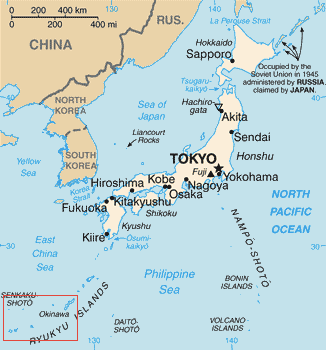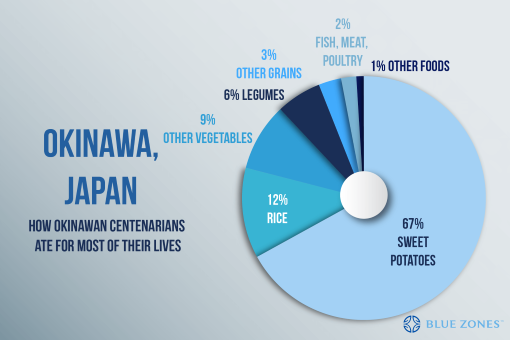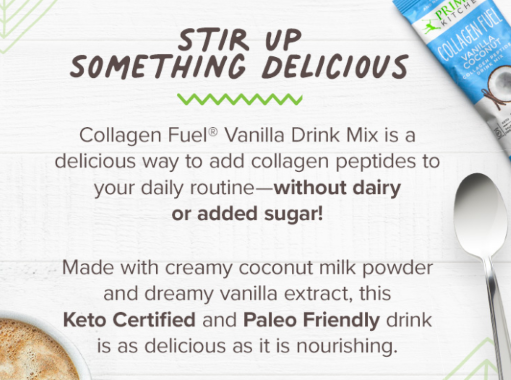Issue #327: 80% is Enough
Good morning. It’s Tuesday, April 9th.
Stat of the Day
The number of calories the average person eats every day in the U.S. That’s 72% more than the 2,000 calorie recommendation. (United Nations)
Learn
Eating Like They Do in Okinawa
We constantly talk about how genetics is only 10-20% of our longevity and we have the power to affect the rest of our future health.
But it’s not just what we do - it’s also where we live.
We’ve all heard about the Blue Zones. I’ve read dozens of articles and studies on these regions around the world and just watched the “Live to 100” docuseries on Netflix.
It’s amazing to see cultures where more people live into their 90’s and 100’s than anywhere else in the world.
Even as these places become more “Westernized” and now need to fight off diseases like the rest of us - it’s so different from how we live. What can we actually do in real life that will help us based on how they live in say Costa Rica or Greece?
There still are some small things that even as individuals we can take away and make some micro-changes (we’re all about Quick Wins) to boost our longevity.
This week - we’re starting in Okinawa, Japan. It’s a chain of islands 900 miles south of the main islands of Japan - it’s actually much closer to Taiwan than Tokyo.
The first thing to look at is what they eat and how much.
To eat for longevity it’s not really that hard - eat real food. That’s what they do in Okinawa. Dan Buettner (the Blue Zone guy) called these “medicinal foods.”
Whether or not they are truly medicinal misses the point - these are real plants, grown without chemicals that collectively are good for the body.
They eat a lot of purple potatoes (which we’ve talked about before) - like A LOT, tofu (again without the pesticides on the soy), mulberries for a sore throat, squid ink soup for detox, and asa seaweed to release body heat in the warm climate.
They can load up on this food - full of antioxidants and micro-nutrients without eating too much.
In the U.S., we eat a lot more than we need to (see Stat of the Day). In Okinawa, they only eat 2,000 calories - because this food is nutrient-dense, not calorie-dense.
Their diet is one reason why they have only 20-30% the rate of heart disease, diabetes, or dementia compared to us in the Western World.
Try
80% is Enough
But there’s another trick they use to not overeat - it’s called Hara Hachi Bu.
It literally translates into “8 out of 10.”
Okinawans say this before a meal - it reminds them to only be 80% full and to stop eating before they overdo it.
I remember days back in college when I’d easily eat two Chipotle burritos (it’s true). But it’s not like I felt good after - but I thought that was normal.
Pay attention to your body - remind yourself before a meal that you don’t need to feel 100% full…Hara Hachi Bu.
Thrive25 Partner Spotlight
We’re only biased because it’s good. Our friends at Primal Kitchen make one of the highest quality collagen supplements on the market and they’re always doing regular testing to keep out the heavy metals that invade too many of these unregulated supplement.
So try Primal Kitchen’s Collagen Fuel - no artificial sweeteners, dairy, whey or soy, and 100% paleo and keto friendly.
Enjoy a 10% discount off your entire order at Primal Kitchen. Don’t miss out - click HERE to claim your discount today!
Measure
The Amino Acid You Don’t Know Enough About
Homocysteine is an intriguing biomarker with significant implications for health and it’s not a part of the standard blood panel.
Homocysteine (Hcy) is a sulfur-containing amino acid produced in the body during the metabolism of methionine to cysteine - both essential amino acids. Hcy does not occur in food, so it’s only created through this biological process.
What’s my number?
Elevated levels of homocysteine in the blood (hyperhomocysteinemia) can be a marker for vitamin deficiency, genetic defects, and increased risk of cardiovascular diseases, stroke, and other conditions. There’s even research to suggest high levels of homocysteine affect our metabolism and DNA methylation.
And very low levels, hypohomocysteinemia, may increase the risk of dementia and Alzheimer’s. So it’s important to get this one right.
The unit of measure is micromoles per liter (μmol/L):
Normal: 4-15 μmol/L
Optimal: 4-7 μmol/L
If you register over 50, homocysteine may damage the lining of your arteries, potentially leading to blood clots, raising the risk of heart attack.
Ok, so what?
Diets rich in B Vitamins - especially folate essentially cancel out hyperhomocysteinemia and control homocysteine levels.
The list of foods high in B Vitamins won’t be a surprise - salmon, avocado, tofu, beef, spinach, eggs.
Typically, this lab test is reserved for individuals at risk of cardiovascular disease, have a family history of heart disease or stroke, high cholesterol, smoke, have hypertension, or deficiencies in B vitamins (B6, B12, folate).
But we learned last week to be empowered - this test should be free once/year if you ask for it. And since you don’t want to be hyper OR hypo, know your data and put this on your list for your next physical exam.
Explore
The Masters
A tradition unlike any other. It’s Masters week at Augusta National and we couldn’t be more excited. I mean Max even created a holiday at home - Masters Moving Day, where the ghost of Bobby Jones shares one golf-related present with Max’s kids when the leaders go through Amen Corner on Saturday (someday it will be as big as Valentine’s Day!).
Max had the opportunity to attend Scottie Scheffler’s victory in 2022. The aforementioned “Amen Corner” (holes 11-12-13) embodies the spiritual, blended with nature as you walk through a beautiful, living nursery.
If you get the chance, here’s a few ideas:
Walk the course backwards early in the morning while everyone else is buying merch
Make a stop at Amen Corner on that walk - with dew on the grass and a light fog over Rae’s Creek, just bask in the setting’s beauty (maybe do some birding)
Head to the concessions near #8 green - they’re revamped this year and won’t run out of sandwiches
After you’ve had a Pimento Cheese sandwich, take the nature walk to the left of #2 - it epitomizes the living nursery
In the News
What Your Brain Is Up To While You're Doing Nothing: When your mind is wandering, your brain’s “default mode” network is active. Even in a moment of downtime, a collection of networks in the brain interact with each other. (WIRED)
Simple Yet Effective: The keys to longevity may be simpler than we think. An expert has outlined five small changes that could add some years to your healthspan - and none of them are diet-related. (Source)
Learn to Say ‘No’: Do you say ‘Yes’ to everything? This can be good - when it’s trying something new, but it can be really bad when you’re just saying yes to please other people. (NYTimes)
Thanks for joining us today!
Check out the latest workout videos on our YouTube channel
Got feedback, recommendations or stories to share? Tell us what’s on your mind here
Want this direct to your inbox? Sign up here
Why Thrive25
We’re 40-something dads that felt our bodies and minds start to slow down and we’re not ready for that. We found too much information on every subject. So we started Thrive25 to transform what we’ve learned into something useful for the rest of us to spend just 3-5 min a day to optimize our health & longevity.
This newsletter is for you and we truly value your feedback. Never hesitate to reach out to us at team@thrive25.com.
To health!
Sign up for free:
The information in this newsletter is for informational purposes only and may not be appropriate or applicable based on your individual circumstances. Thrive25, Inc. does not provide medical, professional, or licensed advice. Please connect with your healthcare professional for medical advice specific to your health needs.









